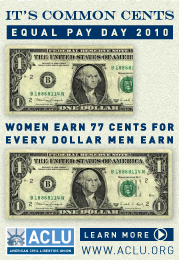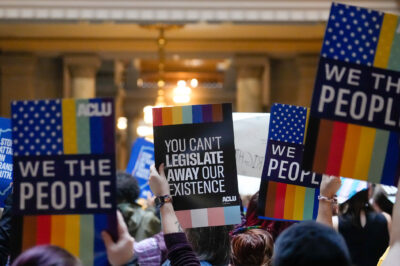Today, Equal Pay Day, marks how far women, on average, have to work into 2010 to be paid the same as men were paid in 2009. In other words, women have to work almost 16 months — nearly four months longer than men do — to make the same amount of money. This is because women who work full time still earn, on average, 77 cents for every dollar men earn. This day is an important reminder of this ongoing problem, but not one we want to continue “celebrating” year after year.

When people hear about the sex-based wage gap, they are often surprised. After all, the Equal Pay Act was passed in 1963 — so why does the difference continue? Unfortunately, the Equal Pay Act has not worked as Congress originally intended. In many instances, the pay disparity exists because of ongoing discrimination, the lingering effects of past discrimination, and inadequate tools and remedies to do something about it.
Besides being unfair, the existence of pay disparities depresses the wages of single-female households and the working families who rely on the salary of all family members to make ends meet. The wage gap also undermines women’s retirement security, which is often based on earnings while in the workforce. According to the congressional testimony of economist Evelyn Murphy, chronic wage discrimination can deprive a woman of between $700,000 and $2 million over her career. This figure grows when the loss of pension and social security benefits is included.
The stark reality for many women is that this difference in pay is a basic survival issue. According to the National Women’s Law Center’s calculations, more than 15.1 million women — about one in eight — are living below the poverty level. In 2008, women were 35 percent more likely to live in poverty than men. President Obama said it well when he noted that equal pay often means:
the difference between affording the mortgage — or not; between keeping the heat on, or paying the doctor bills — or not. And in this economy, when so many folks are already working harder for less and struggling to get by, the last thing they can afford is losing part of each month’s paycheck to simple and plain discrimination.
Modifications and improvements to the Equal Pay Act are necessary to ensure effective protection against sex-based wage discrimination in the workplace, and to provide women with the tools necessary to realize the decades-old promise of equal pay for equal work.
A bill, which has passed the House of Representatives and is currently pending in the Senate, would do just that. The Paycheck Fairness Act (S. 182) would address the shortcomings of the Equal Pay Act in several ways. It would finally close loopholes in the law by requiring employers to show that any wage differences between employees performing the same work must be based on legitimate reasons unrelated to the employees’ sex. In addition, the bill prohibits retaliation against employees who inquire about their employer’s wage practices or disclose their wage information to other employees. And the bill levels the playing field by ensuring that women who are discriminated against in the workplace can obtain the same remedies as those who suffer from discrimination based on race or national origin. Finally, the Paycheck Fairness Act would also improve data collection about pay disparities and provide training and technical assistance to both employees and employers alike.
While today marks the 16 months that it takes a woman to earn a man’s yearly pay, today also marks the almost 16 months it has been since the House of Representatives passed Paycheck Fairness Act. Unfortunately, the Senate is yet to schedule a vote. There can be no better to way to mark Equal Pay Day than for the Senate to help end this injustice and pass the Paycheck Fairness Act now. The Senate has the chance to make “celebrating” Equal Pay Day obsolete.



